Originally posted Nov 11 2009 on IBM Developerworks where it got 13,464 views
I was at a workshop with a customer in Manila recently when they started to talk about compression over a client link (especially from Nokia S60 Mobile Phones) – a key value proposition of Lotus Mobile Connect. Not since I was in a Pervasive Technical Sales in Australia / New Zealand had I seen an opportunity for a hosted Lotus Mobile Connect (LMC) deployment. For those of you that weren’t aware that LMC supported a hosted deployment – it does.
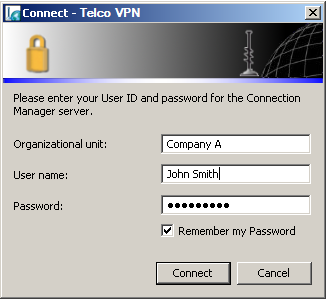
If you have the Mobility Client installed (The client for Lotus Mobile Connect – on any platform) you will notice a field labelled “Organizational Unit” – ever wondered what that is for? It’s simple really. It is there so than in a hosted deployment, the LMC authentication mechanism is able to distinguish between “John Smith” at Company A and “John Smith” at Company B. . Typically, you would use Tivoli Directory Integrator (TDI) to enable a federated directory model so that the individual client companies can manage their own internal directory – and because TDI uses LDAP to communicate with those directories, it doesn’t matter what those client directories are (Domino, MS Active Directory, Sun Directory Server, Novell Groupwise Directory, openLDAP etc) – as long as they support LDAP V3. Basically, there are two deployment topologies that enable LMC to be deployed in a hosted environment… (I have deliberately left TDI out of the diagram since the purpose of the following diagrams are intended to illustrate the Client options and Encryption break or end-to-end)
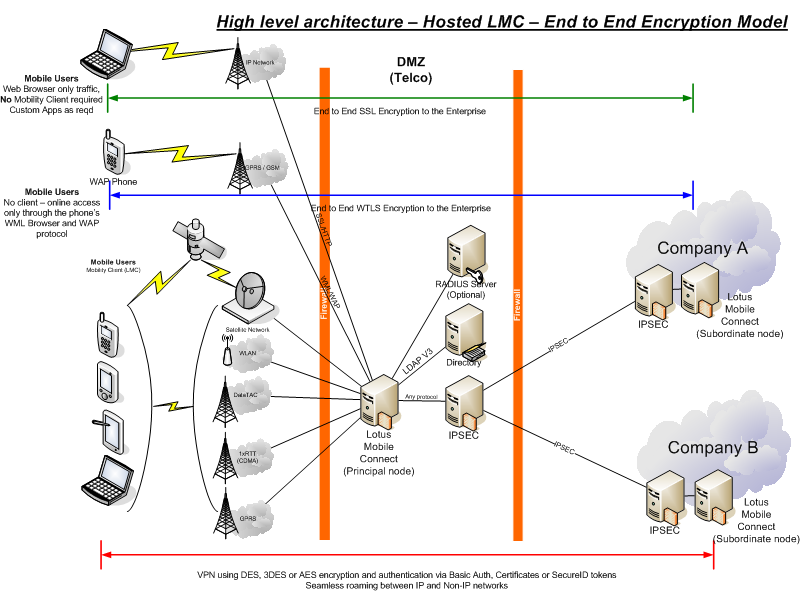
Secondly, there is a lower security (and cheaper to deploy) topology that still gives the end users the advantages of LMC, but without end-to-end encryption – this model requires that the client companies trust the Telco since there is a break in encryption at the Telco’s hosting centre. This model would not be suitable in high security/privacy industries such as Finance, Health, Government, military or Emergency Services.
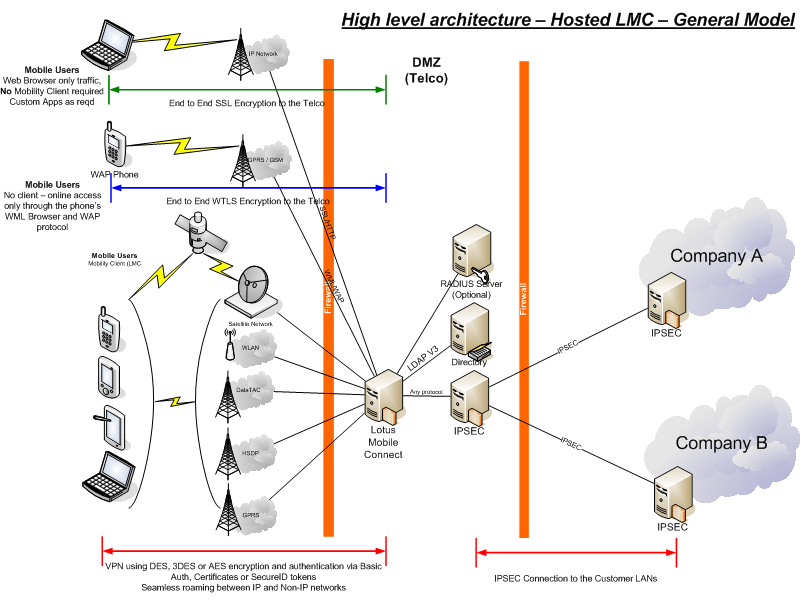
A Telco might offer the lower security model as their standard product and the end-to-end model as the premium service with a price premium… This is a potential salable product to a Telco’s enterprise customers in it’s own right, but if we look at the offering that also come from LotusLive ([particularly LotusLive Notes and LotusLive iNotes). In a market like the Philippines or many others across Asia, I suspect there is a business to be made by offering Domino capabilities or even just plain old hosted email but kept separate from the masses of a Telco’s standard data customers who all get an email address like username@telco.com.ph. Using LotusLive Notes or iNotes would allow a small business to maintain their own virtual email system and keep their own email domain, internal email addresses but without the headaches of looking after their own servers. If we think about the LotusLive offerings in a Telco – where the LotusLive products are rebranded to suit the telco, they could easily go along with a hosted LMC offering. This would provide secure access by remote or mobile users to their own network and their own virtual email environment.
I had hoped that for the LotusLive deployment of Domino in LotusLive notes that some code changes had been made to make Domino work in a multi-realm environment – alas, no. Consequently, there is a minimum customer deployment size of 1000 users – way bigger than most Telcos would be looking for and way too big for the Philippine market. As it stands, LotusLive iNotes is not much better at 500 users, but it so far looks like that is an IBM decision and that if the Telco is to take on the level one support, then it would be up to the Telco to decide what the minimum customer size is to be. Indeed, Some legacy Outblaze (from whom we bought assets from to deploy LotusLive iNotes) customers have some ISP/ASP customers that resell their service to end customers with 5,10 or 20 users.
Perhaps a diagram is in order to explain who it might all come together. I have refined my diagrams that illustrate the hosted deployment of LMC with LotusLive iNotes (or ANY LotusLive product for that matter – Engage, Connections, Meeting etc). First, the Premium offering:
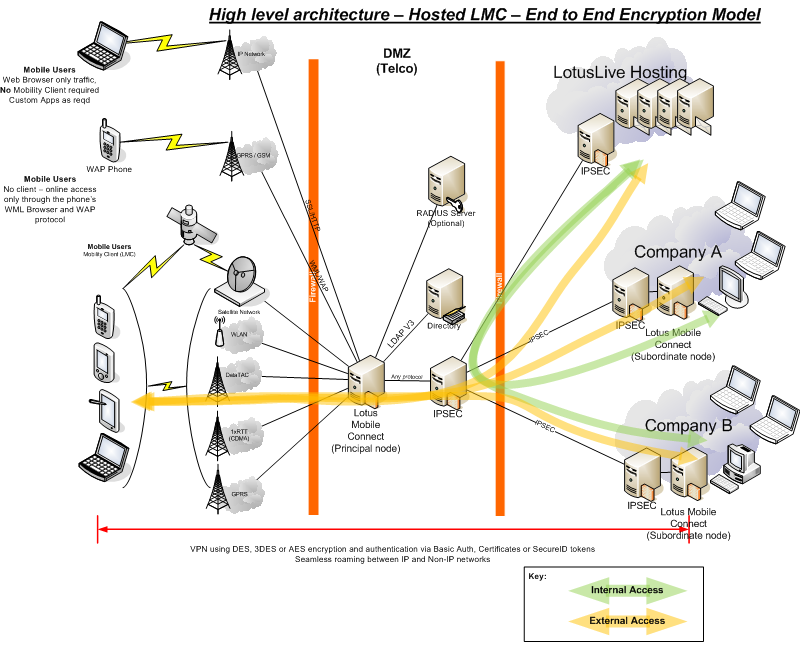
Or in a slightly less secure deployment (with a break in Encryption at the Telco – probably not acceptable for a Bank or Government department, but fine for may smaller businesses) :
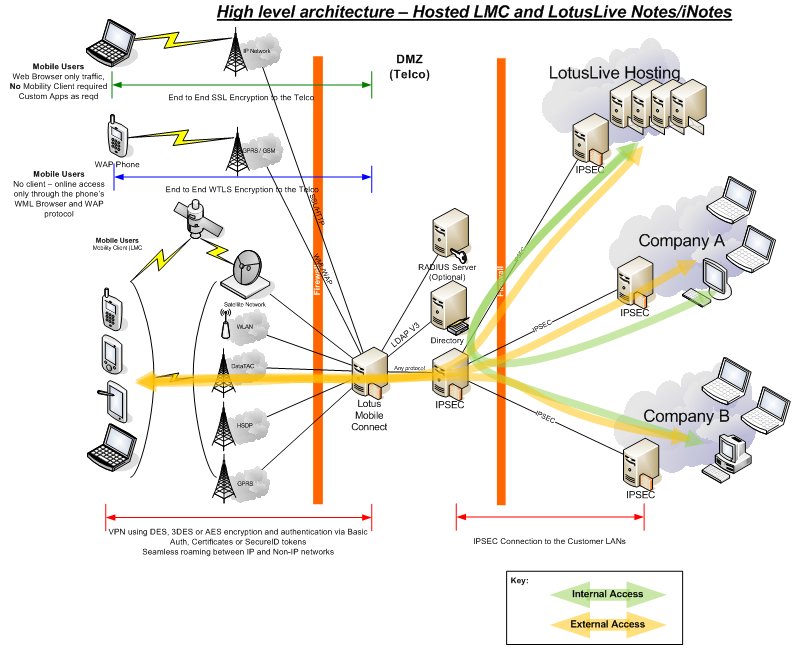
As I see it, a Telco offering this type of service could charge a premium for the end to end encryption model while the second model might be a cheaper service.
As an adjunct to the LMC and LotusLive iNotes offering, a Telco might also offer Lotus Foundations for an on-premise offering to SMBs. I am not sure if Foundations will interest every Telco, but we already have some success with Telco sold Foundations in Singapore. ]If you are interested in understanding this hosted model for Lotus Mobile Connect (LMC) or LotusLive iNotes, please let us know… It could make for an interesting series of blog posts
